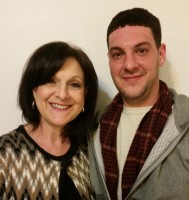New P’ville Support Group Aims to Help Families Tackling Addiction
 Families dealing with loved ones battling substance abuse can often feel isolated, fearing they will be stigmatized or ostracized by neighbors if word gets out.
Families dealing with loved ones battling substance abuse can often feel isolated, fearing they will be stigmatized or ostracized by neighbors if word gets out.
That concern can be even greater in a small community like Pleasantville, where everyone seems to know each other and the entire high school enrollment is less than the senior graduating class at some larger Westchester high schools.
“When you have a child who is in real trouble in a small town like this, everybody knows it, nobody wants to know them or their parents,’ said village Trustee Colleen Griffin-Wagner. “The doors start to close. So then you have a kid with nowhere to go and parents that are completely isolated.”
Griffin-Wagner is one of the founders of Pleasantville C.A.R.E.S. (Community Addiction, Recovery, Education and Support), a new support peer group for family members of those battling mind-altering substances such as drugs or alcohol in the village and surrounding communities.
The group meets Mondays at the United Methodist Church of Pleasantville from 7 to 9 p.m. Residents are free to drop in any time during those two hours. All meetings are confidential and are run by a licensed substance abuse counselor.
Pleasantville C.A.R.E.S. is separate from Pleasantville STRONG, which sponsors an assortment of forums and events to educate parents and young people about substance abuse.
“What I’ve come to learn from Pleasantville STRONG forums is that there is a real need for this,” Griffin-Wagner said. “The people that need this are way past those forums. In most cases they are parents of children who have a serious problem or are heading down a bad track. They are way past learning about binge drinking, they’re in it.”
The group is part of a larger network started in Connecticut by former educator Donna DeLuca. DeLuca worked at the same high school as current Pleasantville High School Principal Joe Palumbo, who put her in touch with Griffin-Wagner.
DeLuca started the C.A.R.E.S. program out of necessity. Two of her four children developed substance abuse issues in Newtown and she found there were no support groups focused on parents facing similar issues anywhere near her in western Connecticut.
“I wanted to be with other parents,” DeLuca said. “I can empathize with someone whose spouse was using, but I can really empathize with another parent. When I started the first group, I was principal of a Catholic elementary school and my 19-year-old son was sticking a needle in his arm, and that was unheard of back in 2003.”
Pleasantville is the fourth chapter, with a fifth starting soon in Ridgefield, Conn. C.A.R.E.S. assists parents and other family members with finding counselors and quality detox rehab facilities for their loved ones on short notice, something DeLuca had trouble doing for her children. The groups shared information on matters such as insurance options.
“You want to at least once a week speak with like-minded parents who are good parents whose children were inflicted with the disease of addiction, not through any bad character but maybe just genetic predisposition,” DeLuca said.
Griffin-Wagner said parents often suffer from guilt over their children’s problems. Hearing from other parents in similar situations can help remove stigma.
“You can do everything right as a parent and still end up with a dead child,” she said. “But that’s not what everyone thinks when they’re in the middle of it. They think, ‘What did I do?’”
Aiding DeLuca with the group is her son Matt, 29, a recovering opioid addict. He said expanding into Westchester is part of a larger plan to bring support groups into as many communities as possible.
“I can offer the unique perspective of someone who has been through the process of addiction and come out on the other side, and offer hope to people going through it now or education for people worried they might be going through it in the near future,” Matt DeLuca said.
DeLuca said he started using opioid painkillers recreationally with friends before becoming an addict. He said he often finds himself telling parents that addiction is a disease, not a moral deficiency.
“These are sick people, and changing peoples’ mindset to think of addiction as a disease is very important to me,” he said.
Additional information can be found at www.thecaresgroup.org. The group also has a Facebook page at www.Facebook.com/thecaresgroup.

Examiner Media – Keeping you informed with professionally-reported local news, features, and sports coverage.
